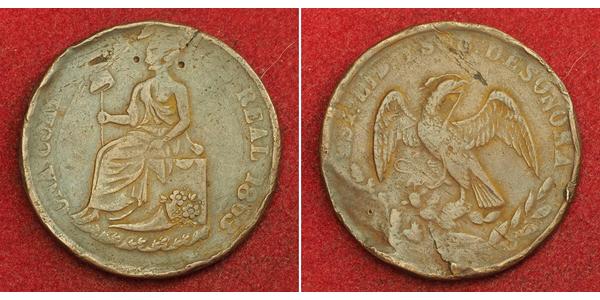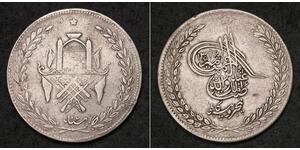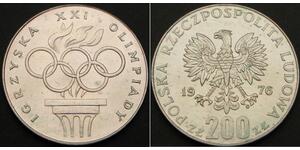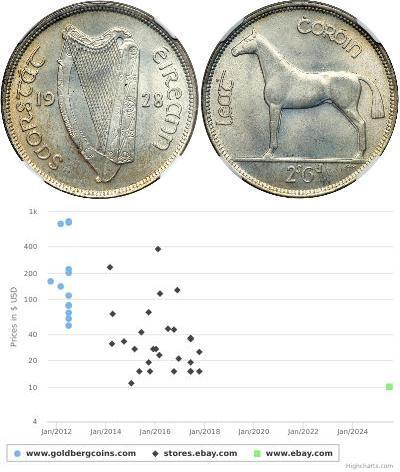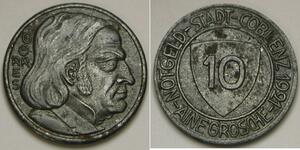(sold for $22.0)
1863, Mexico (1st Republic), Sonora State. Cu 1/4 Real (Una Cuartilla) Coin. Hermosillo!
Mint Year: 1863 Reference: KM-365. Mint Place: Hermosillo Denomination: 1/4 Real (Un Quarto / Una Cuartilla) Condition: Crudely struck on a slightly irregular planchet, edge-hits and two digs in obverse, otherwise F-VF! Material: Copper Weight: 14.44gm Diameter: 33mm
Obverse: Togate lady liberty seated on a base beneath cornucopia (horn of plenty), holding stick topped by a cap. Legend: UNA CUARTILLA DE REAL 1863
Reverse: Eagle with a snake in its beak, standing on a cactus plant, sea waves below. Legend: EST . LIBE . Y SOBO . DE SONORA
Sonora, officially Estado Libre y Soberano de Sonora (English: Free and Sovereign State of Sonora), is one of 31 states that, withMexico City, comprise the 32 federal entities of United Mexican States. It is divided into 72 municipalities; the capital city is Hermosillo. Sonora is bordered by the states of Chihuahua to the east, Baja California to the northwest and Sinaloa to the south. To the north, it shares the U.S.–Mexico border with the states of Arizona and New Mexico, and on the west has a significant share of the coastline of the Gulf of California. Sonora is home to eight indigenous peoples, including the Mayo, the O’odham, the Yaqui, and Seri. It has been economically important for its agriculture, livestock (especially beef), and mining since the colonial period, and for its status as a border state since the Mexican–American War. With the Gadsden Purchase, Sonora lost more than a quarter of its territory. From the 20th century to the present, industry, tourism, and agribusiness have dominated the economy, attracting migration from other parts of Mexico.
The United Mexican States (Spanish: Estados Unidos Mexicanos), was established on 4 October 1824, after the overthrow of the Mexican Empire of Agustin de Iturbide. In the new constitution, the republic took the name of United Mexican States, and was defined as a representative federal republic, with Catholicism as the official and unique religion.
However, most of the population largely ignored it. When Guadalupe Victoria was followed in office by Vicente Guerrero, who won the electoral but lost the popular vote, the Conservative Party saw an opportunity to seize control and led a coup under Anastasio Bustamante, who served as president from 1830 to 1832, and again from 1837 to 1841.
This coup set the pattern for Mexican politics during the 19th Century. Many governments rose and fell during a period of instability caused by factors including 1) the control of the economic system by the large landowners, 2) the struggle over the status of Mexico's northern territories, which issued in a devastating defeat at the end of the Mexican–American War; and 3) the gulf in wealth and power between the Spanish-descended elite and the mixed-race majority.
The main political parties during this era were the Conservatives (favoring the Catholic Church, the landowners, and a monarchy) and the Liberals (favoring secular government, the landless majority, and a republic).

|
Posted by:
anonymous 2019-04-24 |
2 coin descriptions were improved from 2025-07-02 to 2025-07-09
One of them is:
10 Pfennig Germany Iron
group has

